Ark Invest Bitcoin ETF will ‘not provide investors with direct exposure to spot bitcoin’
The ARK 21Shares Bitcoin ETF filing has had an amendment to its language, transitioning from providing direct exposure to Bitcoin to stating it is offering investors indirect access. This pivot, detailed in the latest S-1 amendment, marks a potentially confusing development in the evolution of spot crypto ETFs.

Per the original October prospectus, the Trust aimed to grant investors direct exposure to Bitcoin, facilitating entry into the Bitcoin market through traditional brokerage accounts without the complexities of direct Bitcoin handling or acquisition. However, the recent amendment delineates a shift to indirect Bitcoin exposure for investors. This change suggests a strategic realignment in how the Trust positions itself within the increasingly scrutinized realm of cryptocurrency investments.

Editor’s Note: The amendment has only been released, and CryptoSlate is actively reviewing the 70,000+ word document. The current report is based on a like-for-like review of the document’s language and may not be fully representative of the amendment as a whole.
21Shares ETF vs. Grayscale Bitcoin Trust.
The shift in ARK 21Shares Bitcoin ETF’s strategy to provide indirect exposure to spot Bitcoin appears to bring it closer to products like the Grayscale Bitcoin Trust (GBTC). However, there are still distinct differences between the two:
Structure and Operation:
ARK 21Shares Bitcoin ETF: As an ETF, it is designed to track an index (in this case, the CME CF Bitcoin Reference Rate – New York Variant) and offers indirect exposure to Bitcoin. It operates under ETF regulations, providing a structure that is typically more liquid and trades on an exchange similar to stocks.
Grayscale Bitcoin Trust (GBTC): GBTC is a trust that directly holds Bitcoin. GBTC investors own shares representing a portion of the bitcoin held by the Trust. It’s not an ETF but operates more like a closed-end fund, and its shares can be traded at a significant premium or discount to the underlying bitcoin value.
Market Exposure:
ARK 21Shares Bitcoin ETF: By offering indirect exposure, this ETF may utilize various financial instruments or derivatives to track Bitcoin’s price rather than holding Bitcoin directly. However, the filing does still state that the Trust will hold Bitcoin according to the current filing.
“In seeking to achieve its investment objective, the Trust will hold bitcoin.”
Grayscale Bitcoin Trust: GBTC provides direct exposure to Bitcoin’s price as it holds actual Bitcoin. The value of GBTC shares is directly tied to the fluctuating value of the Bitcoin it holds.
Regulatory Framework:
ARK 21Shares Bitcoin ETF: As an ETF, it is subject to specific regulatory requirements and disclosures under ETF guidelines, which may include more stringent reporting and operational standards.
Grayscale Bitcoin Trust: GBTC, as a trust, operates under different regulatory provisions. While it follows specific disclosure requirements, it does not have the same regulatory burdens as a standard ETF.
Redemption and Creation Mechanism:
ARK 21Shares Bitcoin ETF: The ETF has a mechanism for creation and redemption that involves authorized participants, which helps the ETF closely track its net asset value.
Grayscale Bitcoin Trust: GBTC does not have a redemption mechanism in the same way as an ETF, which can lead to discrepancies between the share price and the underlying asset value.
Repositioning of ARK’s ETF filing.
This repositioning of ARK’s ETF offering reflects broader trends in the regulatory landscape, notably highlighted by Eric Balchunas’s tweets. The Securities and Exchange Commission’s (SEC) Trading & Markets division actively engages with exchanges about Bitcoin ETFs, mainly focusing on the creation process. According to Eric Balchunas from Bloomberg, the SEC prefers cash creations over in-kind ones, indicating a regulatory inclination towards more traditional, perhaps conservative, investment structures in the volatile crypto market.
The implications of this regulatory preference are far-reaching. Most ETF filers planning for in-kind creations may now face the necessity of adjusting their strategies or risk potential delays. This scenario underscores the influence of regulatory frameworks on the operational aspects of cryptocurrency financial products.
Furthermore, the differing perspectives on cash versus in-kind creations between the SEC and investors also merit attention. While the SEC may lean towards a more controlled environment, investors might find in-kind creations more advantageous, especially considering aspects like spread and taxation. Balchunas’s analysis suggests issuers may push for in-kind methods, indicating ongoing dialogue and negotiation with regulatory bodies.
Moreover, ARK’s S-1 filings reveal more than just strategic shifts. The disclosure of an 80 basis points fee structure and the incorporation of new risk disclosures point to ARK’s proactive stance in aligning with SEC requirements and investor expectations. The focus on risk management and transparency in these updates reflects a maturing approach to structuring and marketing crypto ETFs.
In conclusion, the transition of ARK 21Shares Bitcoin ETF from direct to indirect bitcoin exposure, coupled with the SEC’s active involvement in shaping the ETF structures, signals a pivotal moment in the crypto ETF space.
This is an ongoing development, and the article may be updated as more information comes to light.
BTC Price & Market DataAt the time of press, Bitcoin is ranked #1 by market cap and the BTC price is up 2.44% over the past 24 hours. BTC has a market capitalization of $731.28 billion with a 24-hour trading volume of $17.83 billion. Learn more about BTC ›
Bitcoin
20 Nov at 3:22 pm UTC$37,409.81
2.44%BTCUSD Chart by TradingView
Market summary
At the time of press, the global cryptocurrency market is valued at at $1.43 trillion with a 24-hour volume of $48.2 billion. Bitcoin dominance is currently at 51.30%. Learn more ›




